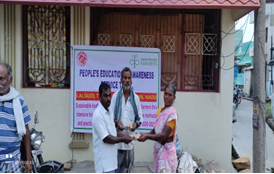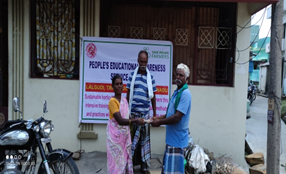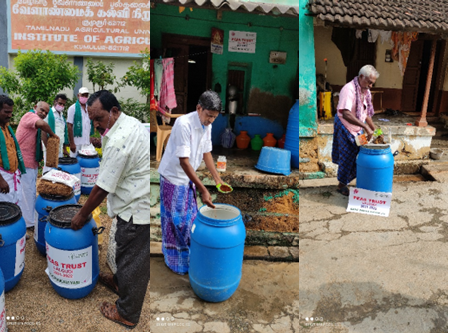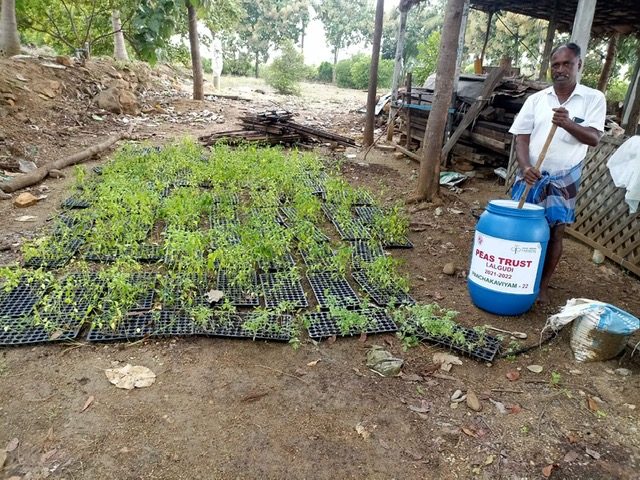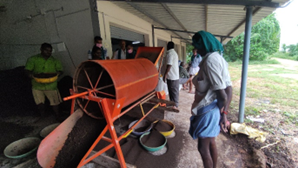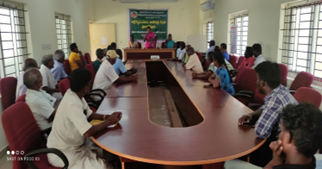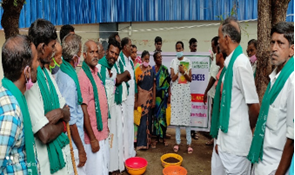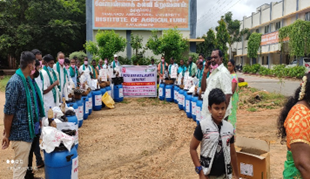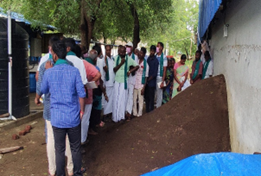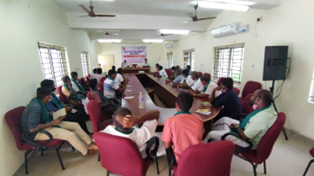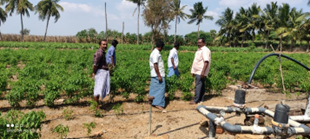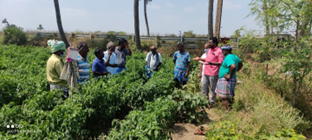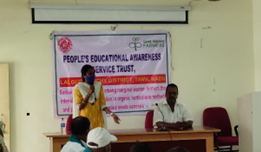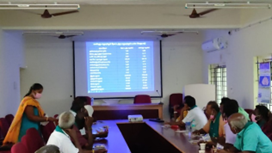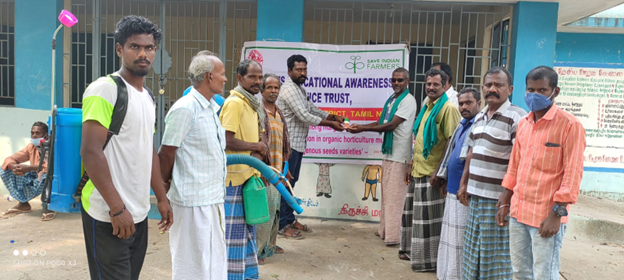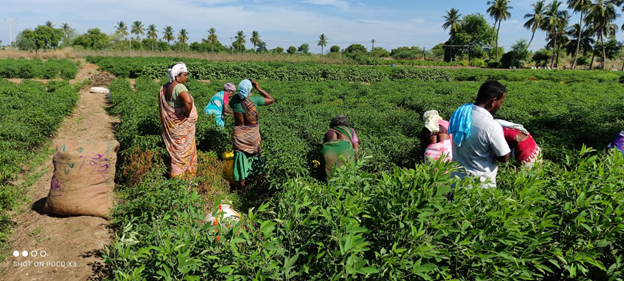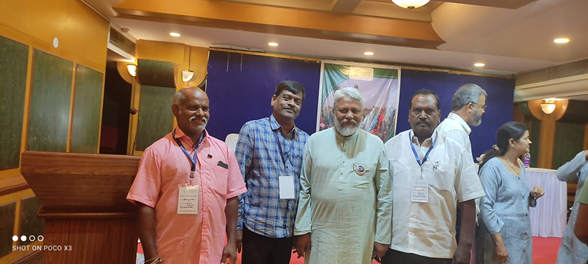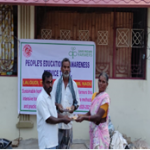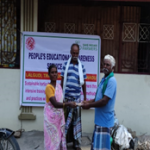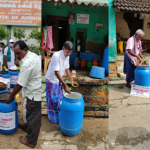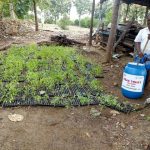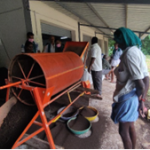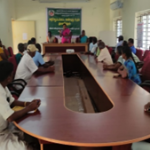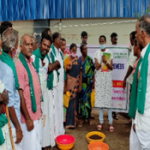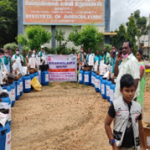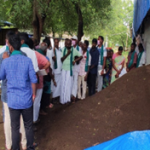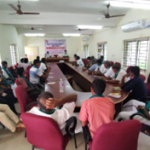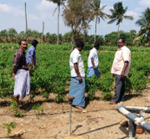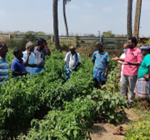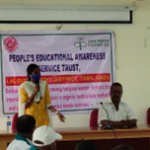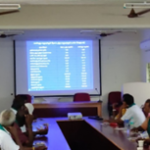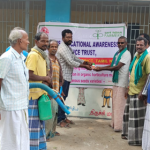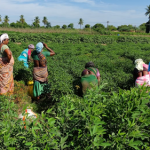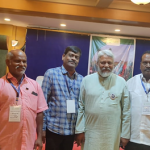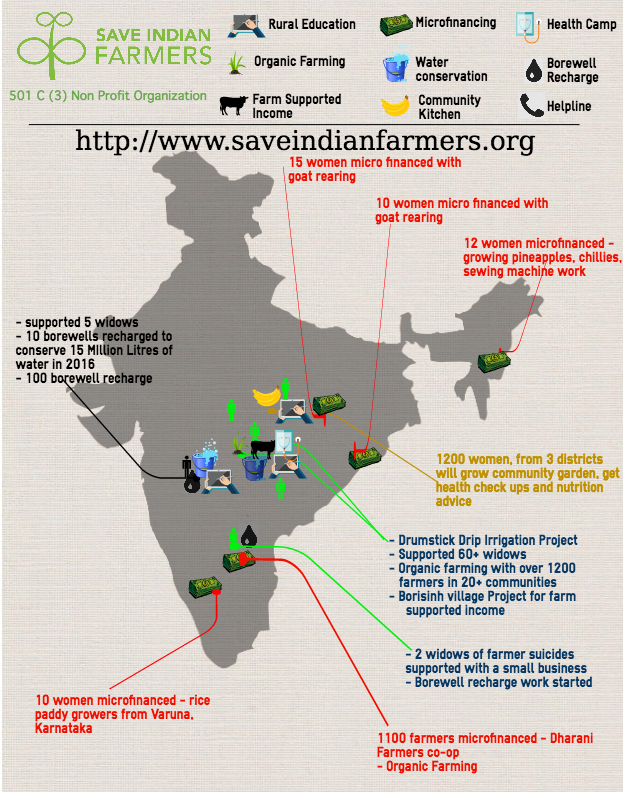Sustainable Horticulture Trichirapalli, Tamil Nadu(Second Year)
Region: Trichirapalli, Tamil Nadu
Focus Area: Sirugalappur, Lalgudi Taluk, Trichirapalli district, Tamil Nadu
SIF Partner: People’s Educational Awareness Service Trust (PEAS Trust)
After successful completion of the first year sustainable horticulture project in Tamil Nadu, SIF and PEAS trust have continued to make progress in the second year.
Background information:
In Tamil Nadu, rare species of trees and medicinal plants are facing extinction due to human greedy nature. State Forest cover average is only 17.59 % below that of expected 33.33 % as per National Forest Policy 1988.
Abuses of plastics, lack of waste management along with lack of policy implementation on solid and liquid wastes has affected the water resources, the environment.
Farmers use greater amounts of chemical inputs, pesticides that have contaminated food grains, vegetables and greens, leaving residues everywhere.
Area of cultivation and number of cultivators are decreasing year by year. Ever increasing prices of chemical inputs, hybrid seeds has resulted in increased production costs.
People are losing their hope in agriculture, and are careful in preventing their future generations to cultivate rather to other professions by selling their lands and educating their wards.
Recently in Tamil Nadu, more than 100 farmers commit suicide due to failed crops, failure of monsoon rains, increased debts, and notices from banks to repay the loans and threats from banks etc.
Strategy:
- Restore the soil fertility by cultivating crops that were successful for generations and ideal to the climatic conditions that prevail in this part of the world and availability of rains, surface water, ground water etc.
- Bring back the indigenous crops back and promote their cultivation intensively that will bring dramatic changes in the climate, cropping pattern, health conditions of the people/ consumers and the sustained income to the farmers..
- Promote organic farming practices. As they do not need a lot of water, moderate and low water is adequate to get good harvests from these crops.
Objectives:
- To identify, select and finalize the list of 30 marginal Dalit women farmers in 2 villages
- To organize project internalization, formation food producers’ councils, managing the project funds, repayments, training of new women beneficiaries, supporting new women farmers for 2 days
- To conduct 5 days intensive, follow up and refresher trainings along with one day exposure visits and field farmers schools for 30 farmers periodically to strengthen their cultivation practices with the help of experts & pioneer farmers.
- To provide seeds for cultivation, support for nursery raising, support costs to raw materials, containers for the production and application of organic farm inputs.
- To organize 5 days intensive training to the 30 first year SIF farmers and organize 3 days follow up and refreshers to 2020-2021 SIF 30 farmers beneficiaries
Activities done so far :
- Distribution of Seeds: Distribution of seeds of tomatoes, brinjal, lady’s finger and Chilies were done to all 30 project farmers’ beneficiaries. Each received seeds of 1092 in total, 273 grams in each variety equally to raise the seeds through nursery raising and transplantation of the seedlings in their prepared and tilled lands.
- Nursery raising Support: All the 30 farmers were given trays to raise their nurseries thru nursery tray methods. However, only 7 of them raised the nursery using the trays, others raised the nurseries thru traditional methods in their well prepared, tilled, manure nurseries in their lands itself.
- Support costs to put up compost, vermicompost, crop tonics, and herbal pesticides: Each farmer received 133 kilos of vermicompost to apply the compost to their crops and also motivate them to prepare the vermicompost on their own in future. They also received the raw materials for the production of Panchakavya, prepared liquids of Meen Amilam (Rotten fish liquid) and Herbal pesticides (fermented bitter plants leaves and stems in cow urine). 100 liters containers were purchased and distributed to all 30 farmers, that will be used to put raw materials, cow’s wastes , allow the contents to ferment and the filtered extract will be sown using sprayers by mixing the extract with adequate quantities of water.
- Orientation Training for 30 farmers: Two days project orientation was organized at the Government Agriculture College premises, Kumulur to prepare the farmers to take up the project intensively and in a sustainable manner. Dr. Sivaranjani facilitated the training to farmers.
- Intensive, follow up and refreshers in sustainable agriculture, horticulture, and cultivation practices (5 days, 2+2+1): 30 farmers underwent 4 days training in sustainable horticulture methods, practices and production of organic farm inputs, pesticides, crop tonics. This training was held at Government Agriculture College premises, Kumulur facilitated by faculties Dr. Shanmugam, Dr. Parthiban. This was followed by a one day follow up training session. Dr. Sivaranjani facilitated the training. The farmers clarified their doubts about the handling of the crops during the harvesting stage and how to keep the pest and insect attack using the pesticides and fungicides.
- Exposure to 30 farmers to pioneer farmers’ lands: 30 farmers were taken to Government Agriculture College, Kumulur farm as an exposure to them to get educated, oriented and be motivated after witnessing the pioneer farmer and their cultivation practices on. Farmers raised their doubts and concern in taking up the organic farm of cultivation with the pioneer farmers. The farmers after the exposure were convinced and felt confident to take up the cultivation using organic farm inputs. Dr. Sivaranjani, Asst. Professor, was the facilitator of the exposure at the farm.
- Field farmers’ schools: Field Farmers schools were conducted at farmer’s fields, to help them to clear their doubts and problems with the help of the experts like Dr. Shanmugam, Associate professor, Institute of Agriculture, Kumulur and experienced farmers.These Field farmers’ schools were organized at periodical intervals to help the farmers to follow up and address their problems during their cultivation. Mr. G.Parthiban, Agriculture expert, Thirumazhabadi facilitated these schools.
- Intensive training to 30 First year SIF farmers: 30 first year SIF farmers were part of an intensive 4 day training program from Dec-21-2021 to Dec-24-2021. This was followed by a one day follow up training session on April 18, 2022. Dr. Sivaranjani facilitated the training. These 30 farmers were given inputs on the basis of their crops, cultivation stages, growth and condition of their crops, ensuring good harvest etc.
- Follow up and refreshers training to 30 First year SIF farmers: First year SIF project farmers’ beneficiaries were helped to undergo 3 days follow up training in order to motivate them and help them to sustain their cultivation practices successfully. These 3 days training was organized at the Government agriculture farmer training center at Kumulur, Government Agriculture Engineering College premises, Kumulur, Trichirapalli district..
- Distribution of Bio Fertilizers to 30 farmers: All the 30 farmers were supported with Bio fertilizers kits containing Rhizobium, Azotobacter, Azospirilium, Pseudomonas putida. Bio fertilizers are means of fixing the nutrient availability in the soil, address nitrogen deficiencies, convert complex material into simple compounds to be taken by plants easily, improves soil fertility, increases crop yield by 20-30% protects crops during drought conditions and soil borne diseases, and ensures soil fertility and sustainability of the agriculture activities.
Training video clip: Local agriculture college faculty providing guidance to the organic vegetable farmers enrolled in the program. Brinjal, okra (lady’s’ finger), chili pepper, and tomatoes are typically grown organically in this method in this project.

